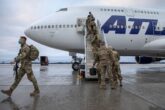June 21, 2011
Obama Preps Afghanistan Drawdown, But Debate Lingers On End Goals
Watch the full episode. See more PBS NewsHour.
JEFFREY BROWN: And we have our own debate now on what the president should announce tomorrow. Retired Army Lt. Col. John Nagl is president of the Center for a New American Security and author of "Learning to Eat Soup with a Knife: Counterinsurgency Lessons from Malaya and Vietnam." Phyllis Bennis is a fellow at the Institute for Policy Studies and author of "Ending the U.S. War in Afghanistan: A Primer." And Brian Katulis is a senior fellow at the Center for American Progress, where he analyzes U.S. foreign policy in the Middle East and South Asia.
Welcome to all of you.
What do you want to hear from the president tomorrow in terms of immediate reductions?
LT. COL. JOHN NAGL (RET.), Center for a New American Security: I actually think the most important thing the president can say is that the U.S. has long-term security interests in Afghanistan and in the region and that we are going to be committed with troops for a number of years to come.
JEFFREY BROWN: A number of years?
LT. COL. JOHN NAGL: For a number of years. And I think that's actually more important than even the pace of this drawdown, important as that is.
JEFFREY BROWN: All right.
Phyllis Bennis, what do you want to hear?
PHYLLIS BENNIS, Institute for Policy Studies: I want to hear that our security interests do not involve hundreds of thousands of troops and contractors there, that the president has listened to the 64 percent of the American people who say that the war is not worth fighting and we should get out right away. That means as long as it takes to get on planes and get them home.
JEFFREY BROWN: Brian Katulis.
BRIAN KATULIS, Center for American Progress: I would like to hear what this transition phase actually means.
This speech will start the beginning of a transition. And I think it signals that. But many people in government who are running this policy, many people on Capitol Hill don't know actually what transition means, in terms of the security metrics, in terms of what we expect from our Afghan partners.
And I think the president will talk about this as a transition, but he needs to put more flesh on the bones in terms of what that actually means and what our end goals are, because, 10 years into this war, we still don't have a clarity of what our end goals are in Afghanistan.
JEFFREY BROWN: Can we put some numbers -- try to put some numbers here? You talk about being -- saying that we're going to be there for a few years, but what about right now? The military still talks about, even at a low end, 3,000 to 5,000 by the end of the year.
LT. COL. JOHN NAGL: Yes, I think that probably all 30,000 surge troops will be out by the end of December 2012. I think that the president will give as much flexibility as he feels he can to the commanders on the ground to govern the pace and the scope of that drawdown.
And I would like to see perhaps a brigade's worth of troops pull out this summer to get us through this summer fighting season. There are fighting seasons in Afghanistan. And that matters -- perhaps another 5,000 out over the winter, and then the final 20,000 come out after the 2012 fighting season in October, November, December.
PHYLLIS BENNIS: I think that's completely off-base. I think...
JEFFREY BROWN: Because?
PHYLLIS BENNIS: Number one, I think this notion of this year's fighting season, there is going to be a fighting season next year. There's a fighting season every year.
That means there's a dying season every year. And too many Afghan civilians are dying. I think that the 100,000 U.S. troops, along with almost 50,000 other NATO troops and almost 100,000 U.S.-paid contractors, many of them security armed forces -- they might as well be troops, except that they're not accountable to the international laws of war -- that has to end.
That means right now, say 50,000, 75,000 are getting out now in the next -- in 30 days, something like that. The dramatic numbers that we have occupying Afghanistan is huge. I think that, because we don't have it on the front pages every day, it's too easy for Americans who don't have themselves a loved one in harm's way to know that we're occupying that country with 150,000 U.S. troops and NATO troops, and 100,000 more mercenaries, at an incredible cost in Afghan blood and in our money that's needed desperately at home.
JEFFREY BROWN: All right.
Now, you said you wanted to focus on the policy. But would you put a number on what that requires?
BRIAN KATULIS: I think, at bare minimum, we should expect about 30,000 troops to come out.
Before the president decided on the surge in December of 2009, he secured a commitment from Adm. Mike Mullen and Gen. David Petraeus. He asked them pointedly, can we get this job done in 18 months, in terms of training the Afghan forces? And he also sent an instruction. He said let's not clear areas that we can't transition to our Afghan partners.
Those are the sorts of questions I hope we come back to. And I think, at bare minimum, again, this is a period of transition that the president had far signaled before. And, at bare minimum, we need 30,000 troops.
I would go beyond that, because I think there's a dangerous slippery slope if we stay there very long with an open-ended commitment that we create this dysfunctional dependency, this culture of dependency on U.S. forces. And we need to motivate Afghan forces to take control of their own country.
JEFFREY BROWN: It's a -- just expand on your earlier point, though, because not only a question of a number of troops, but which troops and what they're doing, right?
BRIAN KATULIS: Absolutely.
JEFFREY BROWN: So, your argument is what? What should we leave the -- the troops that are there, what should they be doing?
BRIAN KATULIS: Well, I think, at bare minimum, they need to help continue to build the Afghan security forces.
People forget that, in Iraq, the surge that mattered the most was the doubling of the Iraqi security forces, and not the 10 to 15 percent increase of U.S. troops. And that's what matters most. And I think the key to that is not only just staying there endlessly, which I'm just very skeptical of people who say we have got to stay there for years on end. We have been there for 10 years. We're going to be there at least for 13 more years, according to the president's plan.
And the key factor here is are we fostering this dangerous and dysfunctional culture of dependency among an Afghan government that we know has been very corrupt and has not been...
JEFFREY BROWN: But, just to be clear, you're also not arguing for the kind of dramatic pullout that Phyllis is talking about?
BRIAN KATULIS: No. And I actually think we need to strike the right balance here. And this is what the president is going to try to do, because there are other issues, like Pakistan. There are issues of, how we do actually maintain some of the gains that are out there?
And I think what the president is going to try to do is strike the right balance here.
JEFFREY BROWN: Well, so, John, so much of this depends on how one thinks about how things are going on the ground. Your argument, I guess, is, if we pull out now, then a lot of what we have succeeded, have accomplished could be lost.
LT. COL. JOHN NAGL: It will be lost.
JEFFREY BROWN: Will be lost.
LT. COL. JOHN NAGL: And I think the success on the ground in the south and southwest of Afghanistan, which has been where the majority of the surge troops have been working for the last 18 months, is pretty undeniable.
We have got Afghan governance starting to take hold. We have got economic development moving into place. And we have, increasingly, the Afghans able to take charge of their own future. And that's ultimately what we're trying to make happen across all of Afghanistan. But, the Taliban is still strong in the east. We have not had the resources to clear that out. That's what I expect to be the priority over the rest of this year and next fighting season.
And we are still building these Afghan security forces who we're going to hand responsibility off to. An abrupt withdrawal would result in the return of the Taliban to power in Afghanistan, the losses of everything we have gained, and incredible suffering for the Afghan people, who want us to be there.
JEFFREY BROWN: You don't see that scenario?
PHYLLIS BENNIS: I don't see that scenario at all.
I think that what is clear is that what we're trying to build in Afghanistan is a kind of military that is accountable to a vision that we have for Afghanistan, not a vision that the people of Afghanistan have for their own lives, which tend to be not focused on a national army, a national police.
This is not a country that has a history, as Iraq does and as so many other places do, of a strong national government. This is a country whose -- where people's identity is smaller. It's as -- people have a particular village, a particular clan, Tajiks, who are part of the military, the Pashtuns, who are not, in general, part of the military.
JEFFREY BROWN: What are -- oh, sorry. Go on.
PHYLLIS BENNIS: I was just going to say that I think the key thing we have to look at is that what we are leaving behind is going to be the same whether we leave this year or whether we leave next year. We can't impose on Afghanistan the kind of dramatic, Western-focused military that we claim to be building. It simply doesn't have the basis to survive there.
BRIAN KATULIS: I disagree with one point of my friend John here. I think he oversells the case for political and economic advances in Afghanistan a little bit too much, and I think if you look at the Senate Foreign Relations Committee majority report that came out like a week or two ago, which highlights some serious concerns about the capacity of Afghan institutions to really sustain themselves.
And there's a big question right now. This year alone, U.S. taxpayers are going to pay $120 billion for operations in a country that has a GDP of about $20 billion. So we're paying six times as much that that country is worth. And we're pouring a lot of cash in there. And I'm not certain that we're seeing the sorts of sustainable gains that will sustain themselves in the long run.
And I actually think one thing that Phyllis mentions in terms of these power-sharing processes and an Afghan solution, the Obama administration is getting much more serious about this. Secretary Gates and others have talked about reconciliation and power-sharing.
But I think we have got a long road ahead to really understand what are the bottom lines of all of the actors that need to be part of that process.
PHYLLIS BENNIS: But there's one...
JEFFREY BROWN: OK. Very quickly.
PHYLLIS BENNIS: Sorry.
There's just one bottom line here that we have to remember, that this is Afghanistan. This is their country. This is what Adm. Mullen said when he was testifying last year and was asked, how is it that, without tanks, without planes, how is it the Taliban is winning?
And his answer was to his own question: It's their country.
JEFFREY BROWN: And let me ask you just very briefly, before we go, you heard Secretary Gates say that this is a now political -- the public is weighing in.
How much of a factor should that be?
LT. COL. JOHN NAGL: I think that the -- what most should matter to the American public is that we leave a situation in Afghanistan such that there is no longer a threat to the American people and our friends and allies around the globe from that country.
And I think, for that to happen, we're going to be involved in Afghanistan for many, many years to come.
JEFFREY BROWN: All right. We will leave it there and see what the president says tomorrow.
John Nagl, Brian Katulis, Phyllis Bennis, thank you all very much.
BRIAN KATULIS: Thank you.
PHYLLIS BENNIS: Thank you.
More from CNAS
-
Afghanistan: Why Does Trump Want to Retake Bagram Air Base?
Lisa Curtis, senior fellow and program director at the Center for a New American Security joined Deutsche Welle to discuss President Trump's comments on the U.S. regaining con...
By Lisa Curtis
-
A Failure to Plan: Examining the Biden Administration’s Preparation for the Afghanistan Withdrawal
Afghanistan, Iraq, and Vietnam. One failure is a horrible accident; two failures are a tragic coincidence; three failures are a disturbing trend that shows the U.S. government...
By Christopher D. Kolenda
-
Against All Odds
Eighteen months after taking power, the Taliban is intensifying its repression of Afghan civil society and cracking down on the rights and freedoms of all Afghans, especially ...
By Lisa Curtis, Annie Pforzheimer & Jan Mohammad Jahid
-
To Help Afghanistan, Engage Its Political Opposition
The effort to help Afghans shape a better alternative should begin now....
By Richard Fontaine & Lisa Curtis




